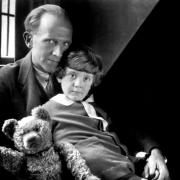Children at Peter Gladwin School in Portslade are learning to love reading with the help of Taboo, a Pets as Therapy dog. Jenny Mark-Bell finds out more
It’s 9am at Peter Gladwin School in Portslade. The buzz of morning greetings has died down, play has been suspended for now and the children are ready to learn.
One of the most eagerly awaited characters lopes through the door wearing a natty yellow bandana. Taboo, in common with some of the students, is 11 years old but unlike them he is a dog – and he plays a key role in school life.
The majestic pointer is a therapy dog and accompanied by his owner Charlotte Barnes he visits the school every Wednesday to help pupils with their reading.
Leon and Archie, both seven, have excitedly pulled their books from the library shelves by the time Charlotte’s got her coat off.
There are many ways in which Taboo has a positive influence on the children, says head teacher Karen Harrison. “We are a very interesting school in that we have the highest number of complex needs children, who could be in SEN [special education]. We are a very inclusive school and we pride ourselves on that. We’ve also seen a number of children become more and more anxious through a demanding curriculum, so we have children with social and emotional health issues within the school as well. But we also have very happy thriving children and we try to provide lots of stimulating and exciting things for all the pupils.”
As well as his main job as a reading dog Taboo has a calming influence, says Karen – especially for those children with complex needs, mental health issues or anxiety. “Some of our children can become what we call disregulated and show challenging behaviour, and a couple of our children can be school refusers. As a therapy dog, at times we will use Taboo as a way of encouraging children to come in and by petting Taboo and talking to him, it calms and regulates the children and then they’re ready to learn.”
It’s clear that the pupils love the huge dog and his benevolent presence. As they walk past on their way between lessons many call his name and reach out to stroke him.
One of the two boys reading with Taboo this morning, seven-year-old Leon, is Polish and English is his second language. Adventure books are Leon’s favourites and he says “I just like reading to him because people interrupt you and he doesn’t. He sits down and listens. My reading has improved and I know if I read more with Taboo I will know more words. Reading with him makes me like reading and I think Taboo likes it too because he puts his paw on the book and wags his tail.”
Many adults find the idea of giving a speech daunting and naturally children have similar apprehensions about reading aloud. Research into animal-assisted learning from the University of California in 2010 found that fluency improved by between 12 and 20 per cent after regular sessions reading to dogs. Anecdotally, Karen says that the results are indisputable: “We track the children who have had a reading programme set and visit Taboo every week. We have definitely seen an impact on their reading. It helps the children become confident readers, and actually to enjoy reading. Some of our children, when they are having difficulties reading and decoding, can become quite stressed.
“Reading to Taboo brings back that love of books.”
This morning’s other reader, Archie (also seven), is a fine example. When he started reading to Taboo last September he was reading very basic books but by Easter he was able to read Harry Potter. Archie says that reading to Taboo makes it easier to think. He likes the way the dog rests his head on him while he’s reading and says he also reads to his gerbil, Sparky, sometimes.
Charlotte became involved with Pets as Therapy after meeting a woman with a PAT dog on the Downs. Aside from the dog passing the necessary assessment she says “a calm, friendly temperament is the top priority – and biddable. But he wasn’t always calm, he was the worst puppy ever – a monster.”
It’s easy to imagine PAT dogs being small and cuddly – lap dogs, really. But Charlotte says Taboo’s size is an advantage in care homes, for example. “Nobody has to stoop and he can put his head on laps.”
She has seen first-hand the impact therapy dogs can have on people from all walks of life: from early years education to later life. “There are some really super moments. I was at a severe learning disabilities school and a little girl who has no obvious cognitive or communicative skills managed to go and get a bowl, find a tap and fill it with water and put it down for the dog. Everybody was tearful that she recognised that the dog wanted some water.”
Although she’s always been interested in training her own dogs – she fell in love with pointers while working as a groom aged 15 – Charlotte’s career was in accounting. “Now, working the dogs as I do, it’s given me quite a sense of purpose in my retirement – I’m busier than I was when I was working.”
Taboo, at 11, will need to retire within the next few years and Charlotte has bred him to ensure another generation of therapy dogs – his daughter is already working. “His little daughter is absolutely beautiful and I’m so proud that I’ve carried that on to the next generation.
“I think they’re born to do it, if they need training they’re not suitable. They’re born not made, it’s almost like a vocation.”
Need to know
For more information visit - www.thekennelclub.org.uk/barkandread or petsastherapy.org
More…
• Staycations in Sussex: Dog-friendly hotels - Many dog-owners see their four-legged friend as an intrinsic part of home life. So it is not surprising that when it comes to holidays, they want to bring Fido along too. Denise Elphick, co-founder of dog-friendly travel company PetsPyjamas, shares her favourite destinations for Sussex staycations



























